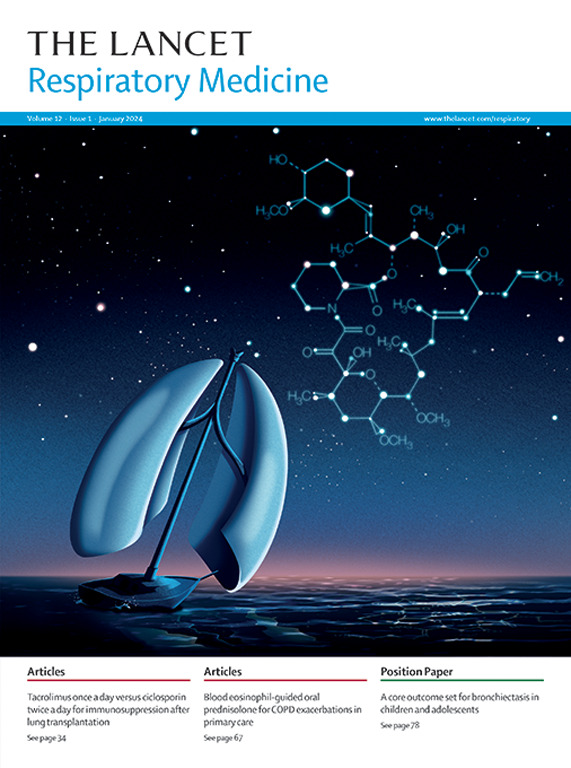Rezivertinib与吉非替尼作为egfr突变的局部晚期或转移性非小细胞肺癌(REZOR)患者的一线治疗:一项多中心、双盲、随机、3期研究
IF 38.7
1区 医学
Q1 CRITICAL CARE MEDICINE
引用次数: 0
摘要
本研究旨在比较rezivertinib (BPI-7711)和吉非替尼作为一线治疗egfr突变的局部晚期或转移性非小细胞肺癌(NSCLC)患者的疗效和安全性。这项多中心、双盲、随机、3期研究(REZOR)纳入了来自中国50家医院的符合条件的患者。经中心实验室组织学或细胞学证实为EGFR外显子19缺失或外显子21 Leu858Arg突变的NSCLC患者被随机分配(1:1),每天接受一次rezivertinib (180mg)或吉非替尼(250mg)治疗,直到出现不可接受的毒性、疾病进展或其他治疗停止标准。每个周期21 d。主要终点是无进展生存期,在意向治疗组中通过隐蔽性独立中心评价(MICR)评估。该试验已在ClinicalTrials.gov注册,注册号为NCT03866499,随访正在进行中。在2019年7月15日至2022年2月14日期间,695名患者接受了筛查。其中,369名符合条件的患者被随机分配以1:1的比例接受瑞齐替尼180 mg/天加安慰剂(n=184)或吉非替尼250 mg/天加安慰剂(n=185);所有符合条件的参与者都被纳入意向治疗组。经micr评估的中位无进展生存期,瑞齐替尼组为19.3个月(95% CI 13.8 - 21.1),吉非替尼组为9.6个月(8.4 - 11.3)(风险比[HR] 0.48, 95% CI 0.36 - 0.63;P<0·0001)和预先指定的亚组疗效分析结果一致。瑞齐替尼组的中位暴露时间为16.0个月(95% CI 0 - 29.7),吉非替尼组的中位暴露时间为11.0个月(0 - 28.9)。3级或更高级别治疗不良事件(rezivertinib组184例中82例[45%];吉非替尼组185例中有80例[43%])和治疗相关不良事件(TRAEs;rezivertinib组184例患者中43例(23%);吉非替尼组185例患者中有43例(23%)在两组中相似。rezivertinib组有1例患者死于TRAE,原因是肺炎和间质性肺疾病。我们的研究结果表明,对于egfr突变的局部晚期或转移性NSCLC患者,瑞齐韦替尼作为一线治疗是一个潜在的选择,因为与吉非替尼相比,瑞齐韦替尼在靶向患者中的总体疗效和亚组无进展生存率更高。没有发现新的安全信号。贝塔制药(上海)有限公司和国家科技重大专项重点新药开发项目。本文章由计算机程序翻译,如有差异,请以英文原文为准。
Rezivertinib versus gefitinib as first-line therapy for patients with EGFR-mutated locally advanced or metastatic non-small-cell lung cancer (REZOR): a multicentre, double-blind, randomised, phase 3 study
Background
This study aimed to compare the efficacy and safety of rezivertinib (BPI-7711) and gefitinib as first-line therapies in patients with EGFR-mutated locally advanced or metastatic non-small-cell lung cancer (NSCLC).Methods
This multicentre, double-blind, randomised, phase 3 study (REZOR) included eligible patients from 50 hospitals across China. Those who had been histologically or cytologically confirmed as having NSCLC with EGFR exon 19 deletion or exon 21 Leu858Arg mutation by central laboratory were randomly assigned (1:1) to receive once daily either rezivertinib 180 mg or gefitinib 250 mg, until unacceptable toxicity occurred, disease progression, or other treatment discontinuation criteria were met. Each cycle lasted for 21 days. The primary endpoint was progression-free survival evaluated by masked independent central review (MICR) in the intention-to-treat set. This trial is registered with ClinicalTrials.gov, NCT03866499 and follow-up is ongoing.Findings
Between July 15, 2019, and Feb 14, 2022, 695 patients were screened. Among them, 369 eligible patients were randomly assigned to receive either rezivertinib 180 mg/day plus placebo (n=184) or gefitinib 250 mg/day plus placebo (n=185) in a 1:1 ratio; all of eligible participants were included in the intention-to-treat set. Median MICR-assessed progression-free survival was 19·3 months (95% CI 13·8–22·1) in the rezivertinib group and 9·6 months (8·4–11·3) in the gefitinib group (hazard ratio [HR] 0·48, 95% CI 0·36–0·63; p<0·0001) and the prespecified subgroup efficacy analysis showed consistent results. Median duration of exposure was 16·0 months (95% CI 0·0–29·7) in the rezivertinib group and 11·0 months (0·0–28·9) in the gefitinib group. Grade 3 or higher treatment-emergent adverse events (82 [45%] of 184 in the rezivertinib group; 80 [43%] of 185 in the gefitinib group) and treatment-related adverse events (TRAEs; 43 [23%] of 184 in the rezivertinib group; 43 [23%] of 185 in the gefitinib group) were similar in both groups. One patient died from a TRAE in the rezivertinib group, due to pneumonia and interstitial lung disease.Interpretation
Our findings suggested that rezivertinib is a potential choice for patients with EGFR-mutated locally advanced or metastatic NSCLC as first-line therapy, owing to the superior overall efficacy and subgroup progression-free survival compared with gefitinib in targeted patients. No new safety signals were identified.Funding
Beta Pharma (Shanghai) and the China National Science and Technology Major Project for Key New Drug Development.求助全文
通过发布文献求助,成功后即可免费获取论文全文。
去求助
来源期刊

Lancet Respiratory Medicine
RESPIRATORY SYSTEM-RESPIRATORY SYSTEM
CiteScore
87.10
自引率
0.70%
发文量
572
期刊介绍:
The Lancet Respiratory Medicine is a renowned journal specializing in respiratory medicine and critical care. Our publication features original research that aims to advocate for change or shed light on clinical practices in the field. Additionally, we provide informative reviews on various topics related to respiratory medicine and critical care, ensuring a comprehensive coverage of the subject.
The journal covers a wide range of topics including but not limited to asthma, acute respiratory distress syndrome (ARDS), chronic obstructive pulmonary disease (COPD), tobacco control, intensive care medicine, lung cancer, cystic fibrosis, pneumonia, sarcoidosis, sepsis, mesothelioma, sleep medicine, thoracic and reconstructive surgery, tuberculosis, palliative medicine, influenza, pulmonary hypertension, pulmonary vascular disease, and respiratory infections. By encompassing such a broad spectrum of subjects, we strive to address the diverse needs and interests of our readership.
 求助内容:
求助内容: 应助结果提醒方式:
应助结果提醒方式:


